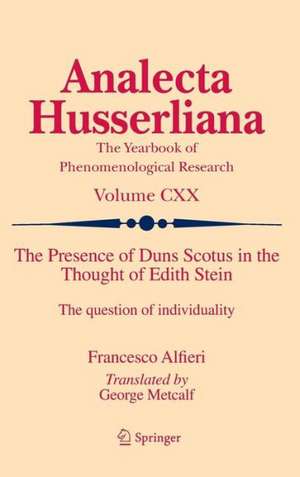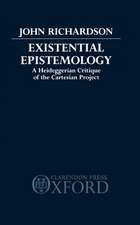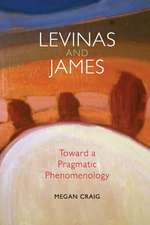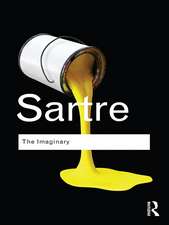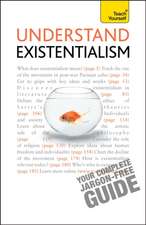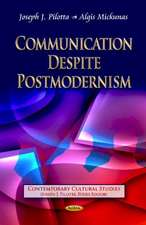The Presence of Duns Scotus in the Thought of Edith Stein: The question of individuality: Analecta Husserliana, cartea 120
Autor Francesco Alfierien Limba Engleză Hardback – 23 mar 2015
| Toate formatele și edițiile | Preț | Express |
|---|---|---|
| Paperback (1) | 382.75 lei 6-8 săpt. | |
| Springer International Publishing – 9 oct 2016 | 382.75 lei 6-8 săpt. | |
| Hardback (1) | 390.08 lei 6-8 săpt. | |
| Springer International Publishing – 23 mar 2015 | 390.08 lei 6-8 săpt. |
Din seria Analecta Husserliana
- 17%
 Preț: 524.10 lei
Preț: 524.10 lei - 24%
 Preț: 814.98 lei
Preț: 814.98 lei - 20%
 Preț: 570.72 lei
Preț: 570.72 lei - 15%
 Preț: 643.00 lei
Preț: 643.00 lei - 18%
 Preț: 1984.67 lei
Preț: 1984.67 lei - 15%
 Preț: 636.12 lei
Preț: 636.12 lei - 15%
 Preț: 643.84 lei
Preț: 643.84 lei - 18%
 Preț: 952.57 lei
Preț: 952.57 lei - 18%
 Preț: 1222.01 lei
Preț: 1222.01 lei - 18%
 Preț: 950.52 lei
Preț: 950.52 lei - 15%
 Preț: 642.18 lei
Preț: 642.18 lei - 24%
 Preț: 1072.12 lei
Preț: 1072.12 lei - 18%
 Preț: 947.67 lei
Preț: 947.67 lei - 18%
 Preț: 1225.94 lei
Preț: 1225.94 lei - 24%
 Preț: 1075.48 lei
Preț: 1075.48 lei - 18%
 Preț: 949.73 lei
Preț: 949.73 lei - 15%
 Preț: 647.59 lei
Preț: 647.59 lei - 20%
 Preț: 577.73 lei
Preț: 577.73 lei -
 Preț: 386.22 lei
Preț: 386.22 lei - 15%
 Preț: 651.19 lei
Preț: 651.19 lei - 18%
 Preț: 960.42 lei
Preț: 960.42 lei - 18%
 Preț: 1128.89 lei
Preț: 1128.89 lei
Preț: 390.08 lei
Nou
Puncte Express: 585
Preț estimativ în valută:
74.64€ • 77.93$ • 61.78£
74.64€ • 77.93$ • 61.78£
Carte tipărită la comandă
Livrare economică 05-19 aprilie
Preluare comenzi: 021 569.72.76
Specificații
ISBN-13: 9783319156620
ISBN-10: 3319156624
Pagini: 200
Ilustrații: XV, 184 p. 6 illus.
Dimensiuni: 155 x 235 x 17 mm
Greutate: 0.46 kg
Ediția:2015
Editura: Springer International Publishing
Colecția Springer
Seria Analecta Husserliana
Locul publicării:Cham, Switzerland
ISBN-10: 3319156624
Pagini: 200
Ilustrații: XV, 184 p. 6 illus.
Dimensiuni: 155 x 235 x 17 mm
Greutate: 0.46 kg
Ediția:2015
Editura: Springer International Publishing
Colecția Springer
Seria Analecta Husserliana
Locul publicării:Cham, Switzerland
Public țintă
ResearchCuprins
Chapter 1: Introduction.- Chapter 2: A historic and critical study of the “Scotist” sources used by Edith Stein.- Chapter 3: The question of the principium individuationis in the writings of Duns Scotus. Ordinatio/Lectura – Quaestiones super Libros Metaphysicorum.- Chapter 4: The intangible individuality of human beings. The originality of Edith Stein’s perspective.- Chapter 5: Conclusion.- Postface.- Bibliography.
Recenzii
“In conclusion, the book of Francesco Alfieri, OFM stands for a valuable contribution to rounding the scholastic and phenomenological meditation and understanding of the (problem of) individuality in its intricate essence and manifestation … . This essay provides a well-argued insight into a controversial and significant issue that remains open to further discussions as one of topical interest concerning the deep meaning of the own being …” (Spotlight, wordtrade.com, Issue. 31, August, 2018)
Notă biografică
Francesco Alfieri is professor of philosophy at the Pontificia Universitas Lateranensis, which appointed him International Area Research Secretary for “Edith Stein in contemporary philosophy”. He is the Editor-in-chief for the annotated Italian edition of the complete works of H. Conrad-Martius and the series entitled “Philosophy – Phenomenology – Texts by Anna-Teresa Tymieniecka”, published by Morcelliana.
Textul de pe ultima copertă
This book examines the phenomenological anthropology of Edith Stein. It specifically focuses on the question which Stein addressed in her work Finite and Eternal Being: What is the foundational principle that makes the individual unique and unrepeatable within the human species? Traditional analyses of Edith Stein’s writings have tended to frame her views on this issue as being influenced by Aristotle and Thomas Aquinas, while neglecting her interest in the lesser-known figure of Duns Scotus. Yet, as this book shows, with regard to the question of individuality, Stein was critical of Aquinas’ approach, finding that of Duns Scotus to be more convincing. In order to get to the heart of Stein’s readings of Duns Scotus, this book looks at her published writings and her personal correspondence, in addition to conducting a meticulous analysis of the original codexes on which her sources were based. Written with diligence and flair, the book critically evaluates the authenticity of Stein’s sources and shows how the position of Scotus himself evolved. It highlights the originality of Stein’s contribution, which was to rediscover the relevance of Mediaeval scholastic thought and reinterpret it in the language of the Phenomenological school founded by Edmund Husserl.
Caracteristici
Is the first thorough and systematic comparison of Duns Scotus and Edith Stein Addresses a question that was crucial to Scotus and Stein and is still relevant today Is the only book that critically analyses the Medieval influences on Stein’s views of the principium individuationis
